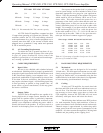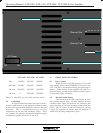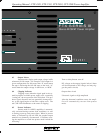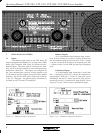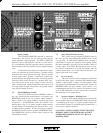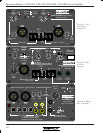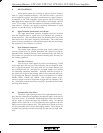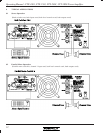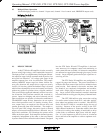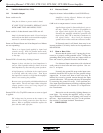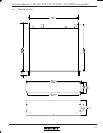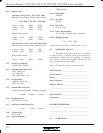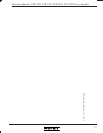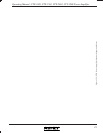
Operating Manual - FTX-1001, FTX-1501, FTX-2001, CFT-1800 Power Amplifier
14
11. TROUBLESHOOTING TIPS
11.1 No Audio Output
Power switch not lit:
Line fuse is blown or power outlet is dead.
IF LINE FUSE IS BLOWN, REPLACE ONLY
WITH SAME TYPE AND RATING FUSE.
Power switch is lit but thermal status LEDs are off:
Amp is in thermal protect mode. Power has been
removed from the audio section until the amplifier
returns to a normal temperature.
Power and Thermal Status are lit but Output Level Meters
are not responding:
There is no input signal applied or input level
controls are off. Note: In parallel mono mode,
be sure that only one signal source is connected
to the amp.
Protect LED is lit and relay clicking is heard:
Output is short circuited or load impedance is
too low. Check speaker cables for shorts, increase
load impedance by disconnecting some speakers.
A high frequency oscillation in the sound system
is occuring when the relays close. Turn down
the input level controls to verify that the amplifier
alone is not causing the problem.
Be sure to use good quality shielded and balanced
input cables. Do not run input cables alongside
output speaker wires over long lengths (ie.
through the same conduit).
Protect LED is lit, Clip LED comes on as soon as signal
is applied:
DC voltage may be present on the output or an
internal slow acting protection fuse may have
blown. Have a qualified technician replace the
fuse with the same type fuse.
11.2 Distorted Sound
Output level meters indicate 0dB level (red CLIP LED on):
Amplifier is being clipped. Reduce the signal
level at the signal source.
0 dB level on output meters is never reached:
Applied input signal is distorted before it gets to
the amp. Check to see if a piece of equipment in
the signal chain before the amp is clipping.
Normally the amplifier should be operated with
input levels fully CW to maximize headroom in
the signal source. Also check for damaged
speaker drivers that could cause distorted sound.
If distorted sound is still heard, there may be an
internal problem. Call Ashly Audio service department at
800-828-6308.
11.3 Hum or Buzz Noise
Be sure that the power cord’s 3-prong plug is con-
nected to a properly earth-grounded outlet. Lifting the
grounding third prong usually does not improve hum or
buzz and creates a potential electrical shock hazard.
Use balanced input connections with a balanced
audio source for best hum and buzz rejection. See sec-
tion 7.1 on inputs.
Normally the ground lift strap on the input screw
terminals should be left in place for best ground voltage
suppression. In some cases hum or buzz noise may be
induced by excessive ground current through the input
ground connection. This current path may be interrupted
by removing the ground lift strap. If the problem per-
sists, input signal transformers providing complete ground
isolation are available. See section 8.1 on Input Isola-
tion Transformer.
Buzz noise can be caused by lighting dimmers or
neon lights. Try moving the amplifier, wiring, or light-
ing to different location to see if lighting is the source of
the buzz. Input transformers may also fix the problem.
See section 8.1 on Input Isolation Transformer.
12. DIMENSIONS



